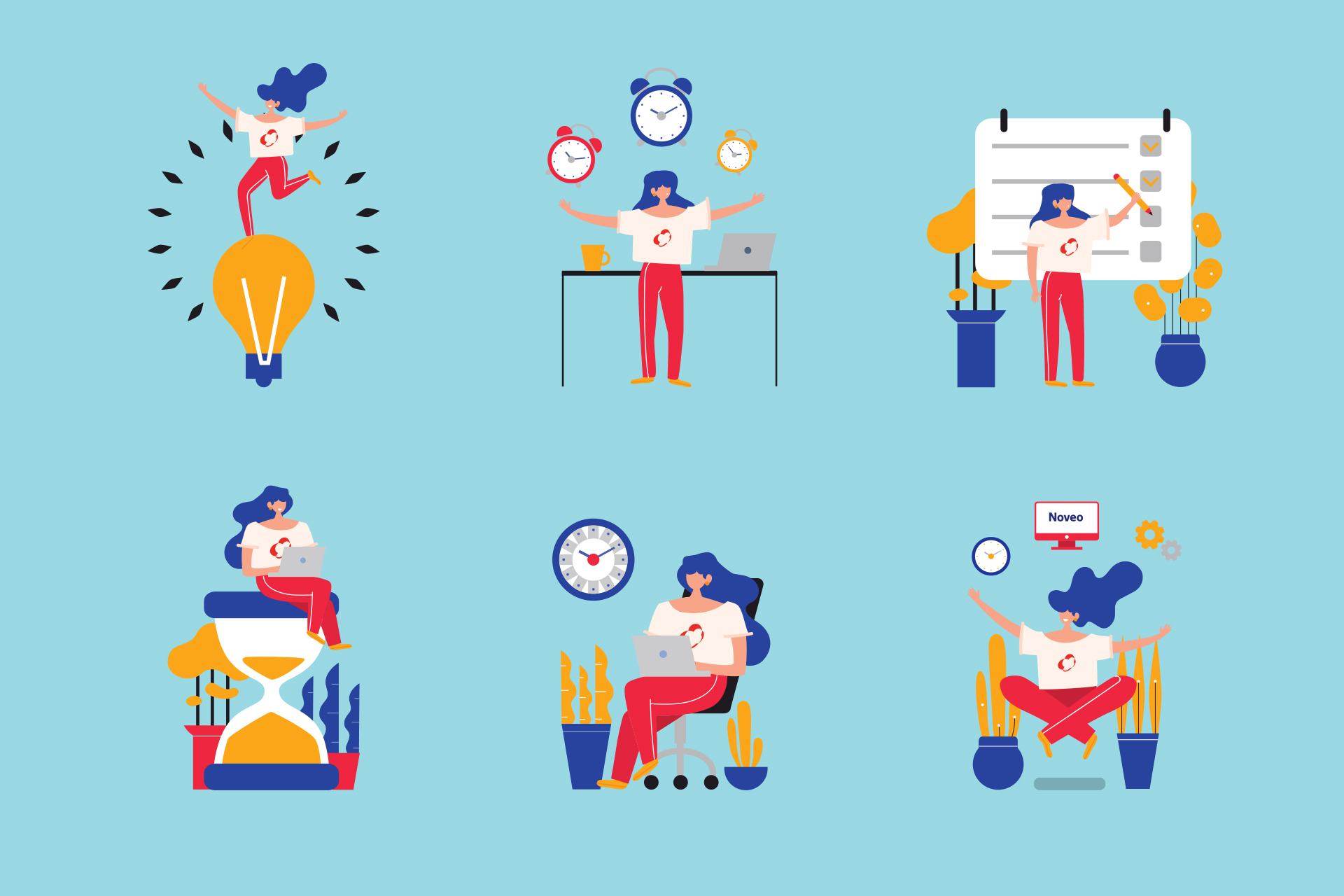People are often bored, sometimes even scared, by the term personal effectiveness; Noveo QA engineer Maria offers you to look into the essence of this notion together.  If we define personal effectiveness as a person’s ability to complete certain tasks quickly and with a good quality, we can see that each of us already exercises such an approach in their current projects every day. Which means that we can extend the area of practices that we use for building up working processes and use them also in our everyday life.
If we define personal effectiveness as a person’s ability to complete certain tasks quickly and with a good quality, we can see that each of us already exercises such an approach in their current projects every day. Which means that we can extend the area of practices that we use for building up working processes and use them also in our everyday life.
Let’s recall the main stages of working on the project and apply them to our normal being:
- purpose,
- analysis and planning,
- goals setting,
- realization,
- testing,
- support.

Purpose
At this stage one of the most important decisions is being taken - about the project’s main and interim goals (some things could change in the process, but it would be extremely problematic to proceed to planning, not having an initial goal) as well as the priorities of their achievement.
At this stage the question of the level of competence and eventual need of additional learning is raised. (Self)education will allow you to complete increasingly more difficult tasks, don’t forget about that.
Analysis and planning
Planning is the basis of everything! Even if we don’t always succeed in strictly following a preliminary well thought-through plan, just the existence of the list of tasks that should be completed by an appointed day, and maybe even by an appointed time, positively helps us to discipline ourselves.
Remember your dashboard in, let’s say, Jira. It's much easier to start performing a task, if it’s already defined, detailed and it is clear what has to be done.
Moreover, the effectiveness of the work depends on the detailed planning not only of the biggest and most important tasks but also of the smallest ones. Try to split the time needed to perform a task into periods, during which you’ll be able to easily concentrate your attention on the task’s fulfillment, and think of some time after such periods for communication in social networks and answers for the uprising questions. Such outlining will help you to better conceive the essence of the task, and planning communication will allow to bring the task to an end and not accidentally switch to completely different questions in the process of discussion.
This is especially important if the whole family stays at home and during the day you have to solve not only business, but also household issues, that you didn’t have to face working in the office. For example, you will have to manage food questions, if all of your family members are used to eating in their cantine. Cooking also takes time that should be planned in advance. Your well-being also influences a lot not only your mood, but also your productivity. Planning your time, be mindful of the necessity to spare a while for yourself, so that sports activities or a visit to the hairdresser wouldn’t prevent you from achieving everything you’ve intended.
Maybe you’ll find it convenient working in short time blocks with 5 to 10 minutes break between them, or long blocks with one or two bigger pauses for lunch and some domestic cares, or maybe you’ll prefer to organize your time in a completely different way. Advices on that point are plenty, and the universal recipe doesn’t exist. You have to work out your own schedule that fits your needs. But with no planning at all at the end of the day you risk to face the same tasks list as there was in the morning.
Note the urgency and importance of the tasks in your list. It will help you to reorient your plan quickly if it is needed. Something unexpected interferes practically everyday, which means that they can be foreseen in your plan beforehand. Programming your day, include in each time block about half an hour of time buffer for tasks that can arise unexpectedly. If none of that kind happens, you just won’t use that buffer and pass on to the next block a bit earlier. But if an urgent task will emerge, your general plan for the day won’t go awry.
But daily plans are just the tip of it. There are also questions, demanding much more time. Maybe you’ll want to implement the sprint practice into your everyday life. Try to identify important points that you would like to complete by the end of the envisaged time period, and to discuss at least in your head the appeared difficulties, as well as advantages and disadvantages of the processes you’ve applied: what led you to achieving the result, and what impeded the work and stole time? Such analysis will help you not only to become more effective, but also to understand yourself better, become conscious of your strengths and weaknesses and establish a schedule ideally convenient for you.
Goals Setting
A properly set goal is fundamental for achieving the result. The most frequent problem here is a bad description. Remember these unforgettable emotions, when you read a task description that doesn't make it really clear, what should be done, how and in what time. So let's begin with wordings. They should be clear, coherent, by preference beginning with the answer to the question “What should be done?” and, most importantly, describe even the elementary actions. If it’s not the case, cut it into smaller tasks. Missions like “build a house” scare, frustrate and lead to the inevitable procrastination, while gathering information about houses’ existing types and what are the usual constructing procedure and timeframes is already much clearer. And such a task won't remain in “In progress” status anymore.
Realization
At this stage your main resource is time, and it is limited, so it’s essential to keep concentrated while implementing the task. Of course the related issues and scenarios are of importance and should be taken into account, but at the same time solving questions off the point distracts you and slows the achievement of the goal down. You’ll certainly devote time for these questions. Just later, at the planned time.
Testing
It may seem paradoxical at first, but thorough fulfillment of the task significantly cuts the time spent for working on it. Nobody returns it to rework, nobody asks to redo it. Isn’t it great? So, before putting the status to “Ready”, put the result of your work into perspective, try to give it a critical look, and imagine different scenarios of development. For example, if you are preparing a public presentation, think not only about what you are going to say, but also about possible questions your audience will want to ask. This can considerably change your final result to the best.
Support
Once released, a project can’t exist eternally in its original state. Same in other domains: think of returning sometimes to large tasks that have already been completed. Maybe you will want to go deeper in some aspects or have new ideas, how to improve the already done work.
Working space and communications
Most probably on your current projects you have a certain working place, development environment, bug tracking system, etc. In case of the projects that also include household chores it is also important to have a dedicated place for working on tasks. Otherwise you can easily get trapped into working with no end in sight, as well as when you don’t have an established working schedule. Different types of tasks will take over all your space, your thoughts and following your time. It’s not recommended to spend all rest breaks at your working place, better make a spacial distinction, even if you work from home.
For example, take your working laptop away after having completed your day’s amount of work; let the kitchen be a kitchen, and not a working office, in the evening. Working with your face towards the window can help you not to get distracted by surroundings, if your window sill is large enough to bear a notebook. Such distinction can help you concentrate better not only on your work, but also on your leisure. Are you sure you can relax properly? ;)
The objects associated with something on your mind can also be helpful in distinguishing space. Even an office lamp on its own can create a working atmosphere on your otherwise cozy balcony.
Work effectiveness also depends on whether you feel like being a part of the team. It is important how successfully working processes in your team are built. But anyway it’s within your power to show more interest in your colleague's business, give support and be willing to help, and the result won’t be long in coming.
And don’t forget to reward yourself for the well done work. If you complete all tasks planned for the day, it’s your victory, even if you don’t think of it as something great. More often the problem is not to perform a task on a high-quality level, but to rationally use your personal time, especially if you work from home.
Literature:
- Goldratt, Eliyahu «The Goal», «Theory of constraints»
- Nassim Taleb «The Black Swan», «Antifragility»
- Daniel Kahneman «Thinking, fast and slow»
- Mihaly Csikszentmihalyi «Flow»
- Manson, Mark «The Subtle Art of Not Giving a F*ck»